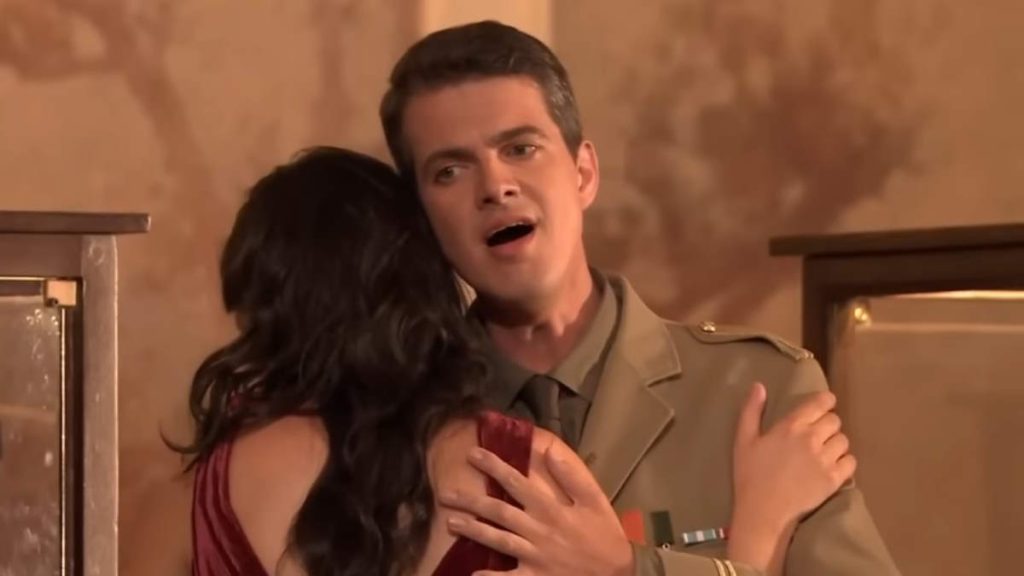Accompanied by the Apollo’s Fire, The Cleveland Baroque Orchestra, the American light lyric soprano Amanda Forsythe sings “Tornami a vagheggiar”, a soprano aria from George Frideric Händel‘s 1735 opera Alcina. Recorded in October 2014 at the Fairmount Presbyterian Church in Cleveland Hts., Ohio.
Performers
- Olivier Brault, concertmaster
- Jeannette Sorrell, harpsichord
- Johanna Novom, violin
- Jennifer Roig-Francolì, violin
- Adriane Post, violin
- Evan Few, violin
- Andrew Fouts, violin
- Emi Tanabe, violin
- Karina Schmitz, viola
- Kristen Linfante, viola
- René Schiffer, continuo cello
- Rebecca Landell Reed, cello
- Sue Yelanjian, bass
Tornami a vagheggiar
“Tornami a vagheggiar” is a famous aria from the opera “Alcina” by George Frideric Händel. This opera, first performed in 1735, is one of Handel’s most celebrated works and is a prime example of Baroque opera. “Alcina” is based on the epic poem “Orlando Furioso” by Ludovico Ariosto, which tells a tale of chivalry and magic in the time of Charlemagne.
The aria “Tornami a vagheggiar” is particularly noted for its virtuosic and expressive qualities. It is sung by the character Morgana, Alcina’s sister, in the first act of the opera. Morgana is in love with a knight named Ruggiero, who is, in fact, betrothed to another woman, Bradamante. In this aria, Morgana pleads with Ruggiero to return her affections, unaware of his true intentions and his existing commitment to Bradamante.
Musically, the aria is characteristic of Handel’s style. It features a lively and ornate melody, demanding agility and expressiveness from the soprano. The aria is set in a bright key and has a fast tempo, which contributes to its cheerful and optimistic character. The accompaniment, typically for Handel’s arias, includes strings and continuo, which provide a rich harmonic foundation and rhythmic drive.
“Tornami a vagheggiar” is often performed in concerts and recitals separate from the opera due to its popularity and showcase of the soprano’s technical skill. It requires not only vocal agility for the rapid coloratura passages but also a great deal of expressiveness to convey Morgana’s playful and seductive character.
This aria is a testament to Handel’s mastery in composing for the human voice and his ability to convey deep emotions and complex characters through music. It remains a favorite among both performers and audiences for its beauty, technical challenge, and emotional depth.
In terms of historical and cultural significance, “Tornami a vagheggiar” and “Alcina” as a whole represent the height of Baroque opera, with Handel being one of the most prominent composers of the era. This work reflects the tastes and aesthetics of the early 18th century, showcasing the ornate and expressive possibilities of music at the time.
Tornami a vagheggiar lyrics [text]
Italian
Tornami a vagheggiar,
te solo vuol amar
quest’anima fedel,
caro mio bene.
Già ti donai il mio cor;
fido sarà il mio amor;
mai ti sarò crudel,
cara mia speme.
English translation
Go back to longing for me,
he only wants to love you
this faithful soul,
my dear goodness.
I already gave you my heart;
my love will be faithful;
I will never be cruel to you,
my dear hope.
Amanda Forsythe
Amanda Forsythe (born 1976) is an American light lyric soprano who is particularly admired for her interpretations of baroque music and the works of Rossini. She has received continued critical acclaim from many publications including Opera News, The New York Times, The Wall Street Journal, and the Boston Globe.
![Amanda Forsythe sings Tornami a vagheggiar [Handel]](https://andantemoderato.com/wp-content/uploads/2024/01/Amanda-Forsythe-Tornami-a-vagheggiar-Handel-1024x576.jpg)
Forsythe made her American stage début with the Boston Early Music Festival, where her many roles have included Poppea L’incoronazione di Poppea, Eolie Desmarest’s Circé, Angelica Orlando Generoso (Campra), Isabelle Le Carnaval de Venise (Campra), Serpina La serva padrona and Edilia Almira, Königin von Castilien, for which she has received rave reviews.
With Boston Baroque, she has sung Poppea Agrippina, Melissa Amadigi, and the title roles in L’incoronazione di Poppea and Partenope. With Seattle Opera, she has sung Pamina Die Zauberflöte, and with Opera Philadelphia, she recently made her role début as Handel’s Semele.
She made her European operatic début in the role of Corinna Il viaggio a Reims at the Rossini Opera Festival in Pesaro, subsequently returning to perform Rosalia L’equivoco stravagante, and Jemmy Guillaume Tell, which were both released on DVD. At the Royal Opera House in Covent Garden, she has performed Nannetta Falstaff, Manto Niobe, Amour Orphée, and most recently, Marzelline Fidelio. Other European engagements include Pamina Die Zauberflöte in Barrie Kosky’s production at the Teatro dell’Opera di Roma and the Komische Oper in Berlin.
She has performed under the baton of Giovanni Antonini, Jonathan Cohen, Laurence Cummings, Sir Colin Davis, Sir John Eliot Gardiner, Daniele Gatti, Matthew Halls, Thomas Hengelbrock, Nicholas Kraemer, Bernard Labadie, Susanna Mälkki, Nicholas McGegan, Christopher Moulds, Riccardo Muti, Andris Nelsons, Sir Antonio Pappano, Martin Pearlman, Christophe Rousset, Jeannette Sorrell, Stephen Stubbs, and Jaap van Zweden. She has premiered opera productions by Gilbert Blin, Robert Carsen, Tobias Kratzer, and Graham Vick.
Sources
- Alcina [Händel] on Wikipedia
- Amanda Forsythe on Wikipedia
- Amanda Forsythe’s official website
- Apollo’s Fire official website
